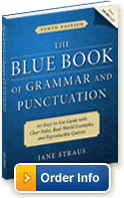|
Hi, Friend.
Welcome to your GrammarBook.com E-Newsletter.

|
"Thank you so much for sending these weekly grammar tips. They really help me a lot."
- Reymin C.
"I'm your biggest fan! I've just ordered The Blue Book of Grammar and Punctuation and can't wait to see it."
- Guilherme G.
"Your weekly E-Newsletters are very informative and interesting."
- Vicki K.
|
|
|
The Media Made Me Do It
I heard from a correspondent who hates the phrase gone missing. His e-mail called it an “ear-abrading” and “vulgar” usage. “Sends me right round the bend, mate!” he said.
I did a little digging and found that he’s far from alone. “Gone missing,” according to a word nerd at the Boston Globe, is “the least loved locution of the decade.”
According to the Globe piece, this “chiefly British” phrase has been around since the 19th century, so it’s not some trendy new grotesquerie. It’s also not ungrammatical—if you can go insane, you can surely go missing. So what makes people hate it so much?
Especially considering the lack of a good alternative: I've always felt that "vanished" and "disappeared" sound like the missing person was the victim of a magic trick. And "turned up missing"? Please spare me. Anybody with something better than gone missing, please write.
Maybe it’s that we have a complicated relationship with European savoir-faire in general…and the Brits in particular. Young American males, for instance, deal with a perceived sophistication gap, believing with some justification that English accents and guys named Colin get all the babes.
Ever since that little 18th century uprising of ours, many Americans traditionally have viewed Mother England with an uneasy mix of nostalgia and rebellion, so Brit-isms like “gone missing” can be irksome. Don’t you get irrationally annoyed when your artsy friend says, “Let’s wander about” instead of “around”? Or how about those people who write their phone numbers with periods instead of hyphens: 555.2940 instead of 555-2940…why do I hate that? Even someone putting that heinous horizontal bar through a 7 makes me crazy: “Look at me; I’ve been overseas, and now even my 7’s are refined.”
How many otherwise sensible Americans are mesmerized by Britain’s royal family? And from Cary Grant to Hugh Grant, there’s never been a shortage of British actors in Hollywood. In the early days of talkies, except for gangsters, cowboys, and blue-collar parts, leading men and women had distinct English accents, even though some of them came from Hell’s Kitchen.
Now that my correspondent has exposed my unthinking use of “gone missing,” it’s made me a kinder, gentler word nerd. Remember how the old, intolerant word nerd always blamed pretentiousness when people said “more importantly,” “close proximity,” or “comprised of”? I was being too hard. In fact, we are bombarded with these expressions daily by high-profile media hotshots till our resistance breaks down. With repetition by smug authority figures (who couldn’t pass English 101), some of the worst barbarities gain respectability.
Since we’re on this subject, let’s look at some words that broadcasters mangle.
Envelope, envoy, enclave Though you’d never know it from what you hear over the airwaves, the preferred pronunciation of these words’ first syllable is “enn” rather than the faux-French “ahn.”
Alleged It must come as a shock to many announcers, but alleged is a two-syllable word. It’s pronounced uh-LEJD, not uh-LEDGE-id.
Camaraderie is a five-syllable word, but you usually hear only four in the media. That letter a before the r should be a clue to say comma-ROD-ery, not com-RAD-ery.
Bestiality Everyone’s wrong about this one, because it’s not BEAST-iality. Look at the spelling and then tell me: how do you pronounce b-e-s-t?
Homage This word has spun out of control in the last several years, but for most of my adult life it was correctly pronounced HOMM-ij. Then came AHM-ij, and it went downhill from there. Now we have everyone sounding oh-so-elegant with the pseudo-sophisticated oh-MAHZH, for which there’s really no excuse.
This grammar tip was contributed by veteran copy editor and word nerd Tom Stern.
Due to the E-Newsletter's large readership, please submit your English usage questions through GrammarBook.com's "Grammar Blog."
|
|
Free BONUS Quiz For You!
Friend, because you are a subscriber to the newsletter, you get access to one of the Subscription Members-Only Quizzes. Click here to take a Confusing Words and Homonyms Quiz and get your scores and explanations instantly!

"So convenient...hundreds of quizzes in one click."
Friend, Subscribe to receive hundreds of English usage quizzes not found anywhere else!
- Take the quizzes online or download and copy them.
- Get scored instantly.
- Find explanations for every quiz answer.
- Reproduce the quizzes to your heart's content.
- EASY to use.
- No software to download.
- No setup time.
- A real person to help you if you have any questions!
"Fun to test my skills!" "The explanations really help...thanks!"
Your choice: Subscribe at the $29.95 or $99.95 level ($30 off - regularly $129.95).
"I download the quizzes for my students who don't have computer access."
Subscribe today to receive hundreds of English usage quizzes not found anywhere else!
"Makes learning English FUN!"
 |
Don't need all the quizzes at once?
You can now purchase the same quizzes individually for ONLY 99¢ each. Purchase yours here.
|
|

Get Yours Today!
Get Amazon’s #1 Bestseller in Four Categories!
#1 in Grammar
#1 in Reading
#1 in Lesson Planning
#1 in Vocabulary
|
The Blue Book of Grammar
and Punctuation by Jane Straus
An indispensable tool for busy professionals, teachers, students, homeschool families, editors, writers, and proofreaders.
Now available in print AND as an e-Book! Over 2000 copies are purchased every month!
Order Your Copy Today!
- Hundreds of Grammar, Punctuation, Capitalization, and Usage Rules
- Real-World Examples
- Spelling / Vocabulary / Confusing Words
- Quizzes with Answers
|
View the entire contents online
Discounts available for schools, bookstores, and multiple copies. Order Today!
Wordplay 
Thanks to Patt for sending this one in.
My wife was in labor with our first child. Things were going pretty well when suddenly she began to shout, "Shouldn't, couldn't, wouldn't, didn't, can't!"
"Doctor, what's wrong with my wife?"
"Nothing. She's just having contractions."
Learn all about who and whom, affect and effect, subjects and verbs, adjectives and adverbs, commas, semicolons, quotation marks, and much more by just sitting back and enjoying these easy-to-follow lessons. Tell your colleagues (and boss), children, teachers, and friends. Click here to watch.
|